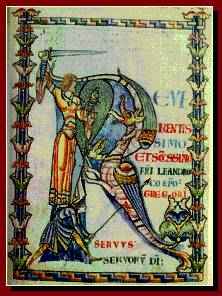|
|
|
The first known written English sentence, "This she-wolf is a reward to my kinsman," is an Anglo Saxon runic inscription on a gold medallion found in Suffolk, dated about AD 450-480. The term "she-wolf" remembers me the Beowulf's tale, where it is narrated how did Beowulf's mother was killed. Nevertheless, it does not mean that English began in that precise moment.English has what might be called a prehistory as well.
The historical aspect of English cannot be divided in just three stages of development, because a lot of tribes and cultures participated on its evolution. It is obvious that English did not simply spring into existence; it was originally brought from Europe by Germanic tribes who had no form of writing. These Germanic tribes just inherited the language and an oral tradition, which consisted in passing the most important tales from a generation to the following one by telling those tales and repeating them many times.
Philologists, the persons who study the evolution of language through time, know that those tribes must have spoken a dialect of a language that can be called West Germanic and that it may habe been similar to some other languages such as German, Dutch, Low German, and Frisian. They know this because of certain systematic similarities which these languages share with each other but do not share with, say, Danish. However, the philologists also know that the similarities between Old Norse and Gothic or Icelandic and Norwegian are significant, they also know that there are similarities between Old English and Old High German or Dutch and English, and they agree that there must have been a common predecessor clalled Germanic. Still earlier, Germanic was just a dialect (the ancestors of Greek, Latin, and Sanskrit were three other such dialects) of a language conventionally designated Indo-European, and thus English is just one relatively young member of an ancient family of languages.
After the arrival of the invaders from the northern part of Europe (including Denmark and northern Germany), old English evolved further from the original Continental form and the regional dialects developed. The Jutes were the first to arrive around the year 449. The Celts had to move north because of the Germanic groups that had just arrived. There were four dialects that evolved after the invaders settled: Kentish- spoken by the Jutes, West Saxon- spoken by the Saxons, Northumbrian and Mercian- spoken by the Angles. Until now, there are no records available for the precise use of these Old English forms; but, by the 9th century, West Saxon became prevalent in literature. Mercian was used as the basis for poetry, for example in the epic poem of Beowulf:

Translation:
Lo! we
[have heard] about the might of the Spear-Danes' kings
in the early days...


From the 8th to the 11th centuries, Vikings plundered lands adjacent to the Baltic and North Seas, and eventually, settled in Britain adding some new words to English. English got even richer with the conquest of the Danish King Cnut of Norway and England, usurping the English throne, in the early 11th century. A lot of Scandinavians settled in England during the Old English period, giving the language several thousand common words.
The language during this period included strong and weak verbs, pronouns, two declensions of adjectives, four declensions of nouns and the distinction of a gender. The vocabulary was scarce and had many different words to express something. This was basically because of the huge external influence from other cultural groups. Some of the words of the Old English come from Celt origin, Welsh, Scottish, Gaelic and Irish. Also Greek derived Latin words were introduced by the contact of the cultures and by the spread of Christianity.
There are major differences between the Old English and the Modern English, such as the present participles of the Old English, which ended in -ende and not -ing, as we are used to. Another big difference is that the past participles bore a prefix ge-. An example of this evolution is the word geandwyrd that means "answered".
Some of the words created during this period: take, cut, both, ill, ugly, altar, priest, psalm, temple, kitchen, palm and pear.